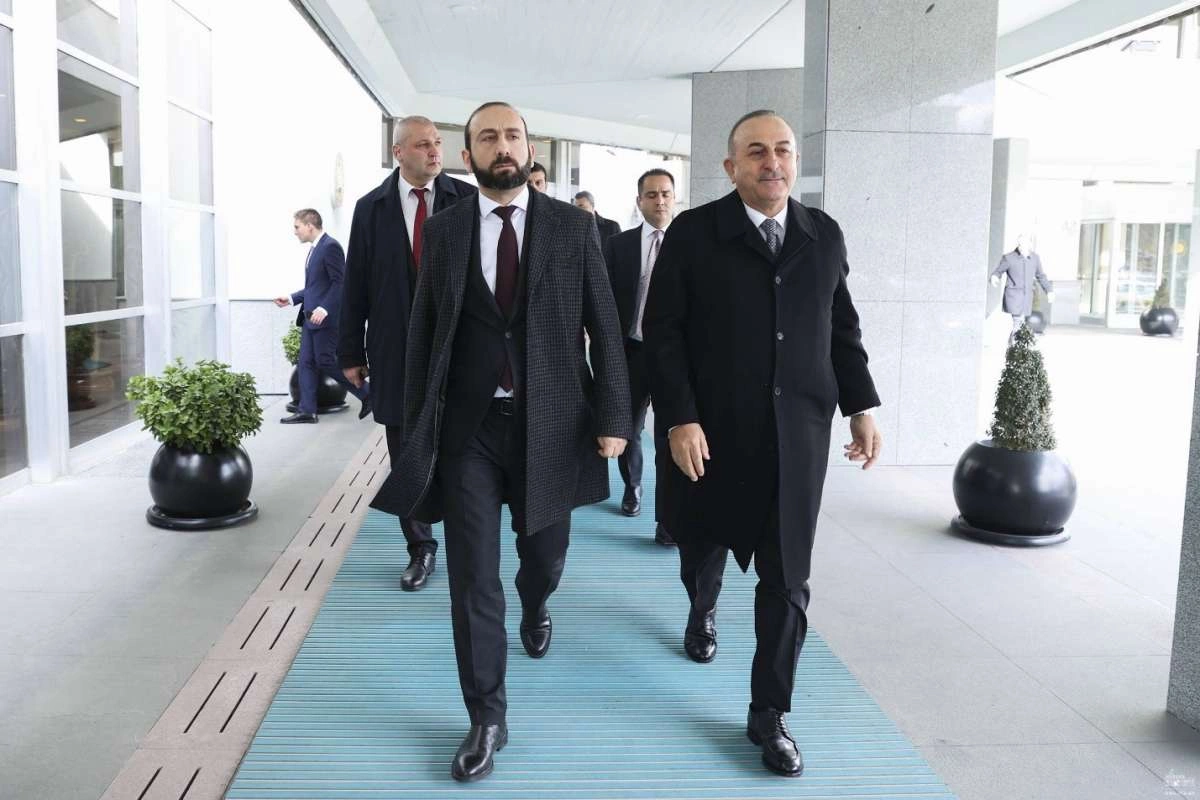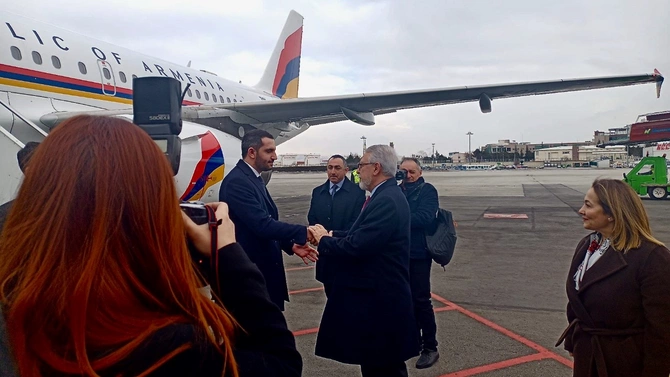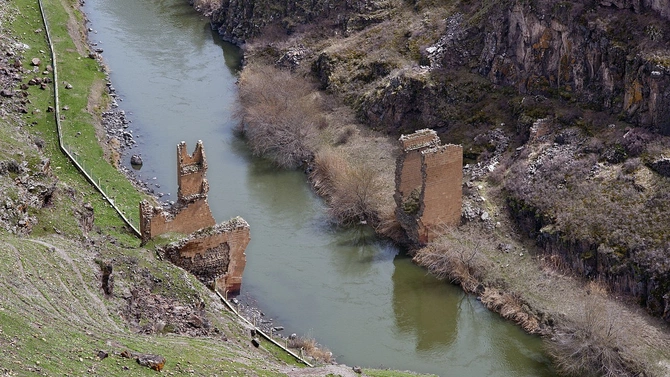
Armenia’s foreign minister’s visit to Ankara surprised many observers. Was it just a goodwill gesture or does the trip signal an expedited opening of the Turkiye-Armenia border in the near future?
Armenian Foreign Minister Ararat Mirzoyan and Turkish Foreign Minister Mevlut Cavusoglu in Ankara, Wednesday, Feb 15, 2023. Image: Armenia MFA
The arrival in Ankara of Armenian Foreign Minister Ararat Mirzoyan following last week’s devastating Kahramanmaras earthquake was sudden and unexpected. The tragedy on February 6 was the deadliest to hit Turkiye since 1923. At the time of writing, the 7.8-magnitude quake has claimed over 35,000 Turkish lives and an additional 6,000 victims in neighbouring Syria. Naturally, international offers of assistance and messages of condolence have flooded in from all over the world.
Including from Armenia.
Both Prime Minister Nikol Pashinyan and President Vahagn Khachaturyan sent their condolences, while humanitarian assistance and a search-and-rescue team were dispatched by Yerevan to assist in the post-disaster relief effort.
“Saddened by the news of the devastating earthquake in Turkiye and Syria that resulted in the loss of so many lives,” Pashinyan tweeted. "Our deepest condolences to the families of the victims […]. Armenia is ready to provide assistance.”
However, such messages and offers of help are not new.
“Armenia also sent humanitarian aid during the 1999 earthquake,” Turkish Foreign Minister Mevlut Cavusoglu said during the joint press event held after meeting Mirzoyan in Ankara. “Unfortunately, Armenia is also in an earthquake zone. The Spitak earthquake of 1988 is still in our memory as a large number of people died. After that earthquake, we sent aid to Armenia through the Alican border, and it was through that border that Armenia sent its aid to Turkey a few days ago.”

Indeed, coinciding with Mirzoyan’s visit, a second convoy of assistance sent by Yerevan arrived in Adiyaman, where it was offloaded in the presence of the Armenian delegation that travelled there from Ankara. Like the first 100-ton aid convoy sent on February 11, it had crossed the Margara-Alican land border, one of two that exist between Armenia and Turkiye, but otherwise lie dormant.
Though Mirzoyan had flown to Ankara from Yerevan, his second trip to Turkiye in an official capacity since attending last year’s Antalya Diplomacy Forum, the aid convoys were the first traffic to cross this Armenia-Turkiye crossing point in over 30 years. Doubtless, this week's visit has greater significance in the wake of the 2020 Karabakh War at a time of renewed international support for the normalization of relations between Armenia and Azerbaijan as well as between Armenia and Turkiye.
Ankara initially closed its border with Armenia when ethnic Armenian forces, backed by Yerevan, took control of the Azerbaijani region of Kalbajar in 1993. The undeclared war between Armenia and Turkiye’s ally, Azerbaijan, claimed over 25,000 lives and forced nearly a million to flee their homes on both sides. Armenia-backed forces took control not only of the breakaway region of Karabakh in Azerbaijan but also of seven adjacent regions, including Kalbajar.
However, the 2020 war between Armenia and Azerbaijan reversed those territorial gains and ostensibly removed the main obstacle to normalizing relations between Armenia and Azerbaijan and Turkiye. As a result, some think Yerevan and Ankara could be on the path to finally resolving their differences. The last attempt in 2009 failed, in no small part, because of alleged pressure by Baku on Ankara, its traditional ally in the region.

This time around, there are hopes that the situation could be different. In December 2021, Armenia and Turkiye appointed Ruben Rubinyan and Serdar Kilic, respectively, as special envoys to discuss the necessary steps for the normalization of relations. Three meetings between the two parties have taken place outside the region, with Ankara favouring the fourth to be held in either Armenia or Turkiye. With Rubinyan and Kilic present at this week’s meeting between Mirzoyan and Cavusoglu in Ankara, that appears to have become a reality.
Practical steps towards normalizing Armenia-Turkiye relations have been modest up until now. On February 2 last year, commercial flights resumed between Yerevan and Istanbul, while on January 6, 2023, Ankara lifted an effective ban on cargo flights. Eight months ago, Armenia and Turkiye announced that the land border would open for third-country nationals “at the earliest date possible,” but that had not actually happened yet. So, the use of the Margara-Alican border crossing to transport humanitarian assistance this week is at least of some relevance.
“Armenia has extended its hand of friendship, showed solidarity and cooperation with us in this difficult time, said Cavusoglu at Wednesday’s press event. “The normalization process in the southern Caucasus region is going on. We believe that our cooperation in the humanitarian field will support this process.”
The two foreign ministers also announced that joint work would be undertaken to restore a historic bridge spanning the river that separates the two countries. “Today we have discussed some details of this process, we have agreed to jointly repair the Ani bridge and take care of the relevant infrastructure before the full opening of the border,” Mirzoyan said in Ankara, also reiterating Armenia’s commitment to the “full normalization of relations and the full opening of the border with Turkey.”

In July last year, Turkish media had already announced that a ministerial briefing in Ankara had detailed such plans for the future. There was a “need for a restoration campaign of some historical architectural structures near Kars, including bridges and buildings that are of importance to Armenians,” Hurriyet reported. This, it also noted, would have particular significance for the large Armenian diaspora.
And in November 2022, Turkish presidential spokesperson İbrahim Kalın also informed the media that technical teams from both countries had already met on the second closed border crossing close to Gyumri, and that the Turkish delegation had crossed over to dine in Armenia. Reminiscent of the ill-fated 2009 protocol process and its much-touted ‘football diplomacy,’ Armenia and Turkiye are also set to play their first UEFA 2024 qualifying match against each other next month in Yerevan. Mirzoyan is also expected to again attend next month’s Antalya Diplomacy Forum.
However, some regional analysts warn that the normalization of Armenia-Turkiye relations is not a done deal, not least because of new uncertainties surrounding the coming Turkish elections. Though not directly linked, the normalization and peace process between Yerevan and Baku also continues to determine the speed and progress in talks between Yerevan and Ankara.
For now, though, Azerbaijan appears to largely support attempts by Yerevan and Ankara to establish diplomatic relations. Or at least does not actively oppose them.
“The progress to be made in the process of normalization of Armenia’s relations with Turkiye and Azerbaijan will ensure peace and prosperity in our region,” Cavusoglu said in Ankara. “I specifically want to say from here that if these three countries take sincere steps, we will establish permanent peace in the South Caucasus. Peace in this region is extremely important for economic prosperity.”
In an article published by CivilNet about what some are now calling ‘earthquake diplomacy,’ Richard Giragosian, the Director of the Yerevan-based Regional Studies Center, wrote, “[…] once again, that Armenia-Turkey normalization stands out as a rare positive “game changer” for the troubled South Caucasus region.”
Share on social media